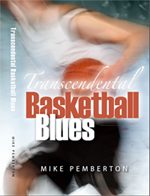A Perfect Blend: Transcendental Basketball Blues Hits All the Right Notes
By Scott Peterson, Fiction Editor, Aethlon: Journal of Sports Literature
In Transcendental Basketball Blues , Michael Pemberton deftly blends young adult and sport literature genres to create a satisfying season-in-the-life story. Jack Henderson is a typical 17-year-old kid from the late 1970s who just wants to enjoy his senior year of high school. Containing but not remaining content with the expected Bildung narrative, Pemberton's novel also presents a series of cultural clashes that elevate the game of both genres in play.
Told against the backdrop of a 70s top forty playlist that provides a thematic resonance with the short, quick-hitting chapters, the book follows Jack from the September morning of his mother's most recent flight from the family to the state basketball tournament in February. These are the days when flipping the bird at a teacher could land you in the principal's office—and the progressive punishment of a play-basketball-or-be-suspended deal brokered by Jack's mayor father and Reggie Collins, St. Jude's first African American varsity coach. Jack decides to make the best of this arrangement by encouraging his friends—the “Running Rams” of local YMCA summer league fame—to try out with him. After any number of drills, whistles, and trips to the strategically placed wastebaskets, Jack and the Rams—who with a mix of races provide the story with the “ethnic platoon” found in war movies from the 1940s and offer a sharp contrast to the homogenous teams of movies like Hoosiers —are ready to begin the journey that will help them mature and take their place in society.
But the Bildung narrative of a young adult protagonist is not often without at least one significant obstacle, and Pemberton's book is no exception. The mental illness of Mary Lou Henderson, Jack's mother, looms large from the opening pages as he watches her silver station wagon slip out of town, and her condition is seldom far from Jack's thoughts at any point in his senior year. As readers, we are privy to the family's struggles on emotional, social, and economic levels as Jack, his father, and younger sisters attempt to deal with Mary Lou's paranoid delusions. Pemberton is to be credited or taking on such a large issue in a YA book—and for handling it in a sensitive, realistic manner.
While Mary Lou's mental illness provides the book with conflict, her musical background contributes heavily to the titular theme. When Jack is struggling to make the transition from street ball to running set plays, his mother makes the comparison between athletics and aesthetics as vehicles for transcendence—with an acknowledged assist to Schopenhauer. Total immersion in the moment, whether on the basketball court or at the piano in the common room of a mental hospital, thus becomes a mantra for Pemberton's characters, and thus creates an apt description for the aesthetic qualities of athletic pursuits.
Perhaps the book's greatest strength is its portrayal of the clash of cultures that was the 1970s. Sam Henderson, Jack' father, stands in for the silent generation of the 1940s—the one that went to war two times before going along with the consensus culture of the 1950s to return to the supposed halcyon/Golden days before the Depression. As a pure shooter with a sweet 16 tournament legacy in his playing days before his service in the army during World War Two, Sam is also a throwback to the days when a parent could “light up a Lucky” in the waiting room of the principal's office without being hauled into a high court. Pemberton also takes on the interface of Black and White cultures with his portrayal of Reggie Collins, the basketball coach who represents the Civil Rights movement of the 60s—which was perhaps somewhat slow to take hold in some of the middle-sized cities in Midwestern states starting (and sometimes ending) with vowels. In a surprising—and not unpleasant—reversal of many sports lit narratives, it is Jack and the ethnic platoon of the Rams who represent the freewheeling streetball culture usually found in the inner cities, creating a significant conflict with the disciplined coaching of Collins and the established jock culture of the players who are in search of college scholarships.
Jack Henderson is no Frank Merriwell: having wild adventures out West with the Rams, rescuing his mother, and racing into the gym in the final seconds to score the winning basket. But then, who could follow the act of the nineteenth century paragon of Victorian virtue? Young readers of a hundred years ago certainly couldn't, and today's readers would just roll their eyes and plug back into their array of electronic devices. What Jack Henderson does do is own up to his mistakes, and that makes him a character that young readers can respect and emulate. Transcendental Basketball Blues will also appeal to parents of a certain age by giving them a way to introduce their children to the classic rock of the 70s while entertaining them with a top-notch sports story at the same time.
© Copyright 2011-2020 Mike Pemberton. All rights reserved | info@mikepembertonbooks.com


